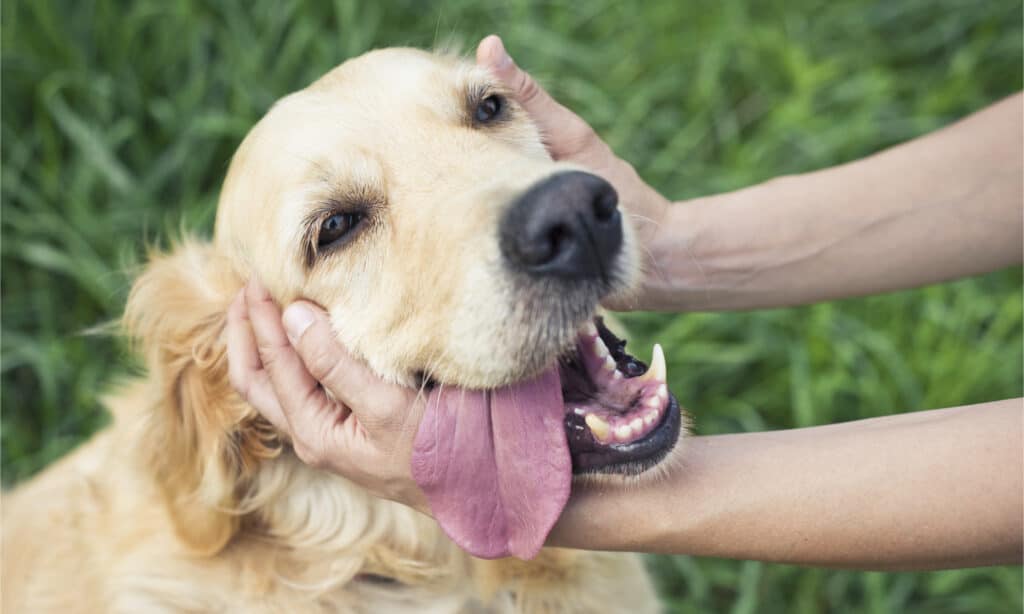The golden retriever is a medium-sized Scottish breed with a lustrous yellow coat. Most recognize them for their reputation as excellent family dogs, often depicted in our favorite movies and shows as loyal, loving pets. And it’s fair to say they are accurately portrayed. This breed is loyal, affectionate, friendly, and eager to please. But are golden retrievers hypoallergenic? Discover the answer now, including how much they shed and how to tell if you are allergic to your family pet.
Are Golden Retrievers Good for Allergy Sufferers?

Golden retrievers are not hypoallergenic. They are moderate to heavy shedders and can cause allergy symptoms.
©iStock.com/LucBrousseau
Unfortunately, golden retrievers are not hypoallergenic. While there is no such thing as a true hypoallergenic dog, some are better for pet allergies than others. All dogs contain proteins in their skin, saliva, and urine that can trigger allergy symptoms.
Some people find that they have no reactions to their golden retrievers when they are puppies. But begin having symptoms to them as they grow older. Adult retrievers may make allergies worse compared to puppies. This is something to keep in mind if you are considering adopting a specific breed. It may be beneficial to spend time around adult versions before making a final decision on bringing home a new golden retriever.
Do Golden Retrievers Shed a Lot?
Golden retrievers are moderate to heavy shedders. Shedding and dander can cause mild to severe allergic reactions in people sensitive to these specific allergens. And, unfortunately, this breed is not a light shedder.
These dogs feature a thick double coat that helps them regulate temperature fluctuations. And while they are beneficial, they do cause quite a mess for their owners. Golden retrievers shed a moderate amount throughout the year, and hair can coat floors, beds, furniture, and clothes. But their plush undercoat is to blame for their heavy semi-annual shed. During spring and fall, you may notice your retriever lose large quantities (more than average) of hair. Blowing their coats helps them prepare for warmer or cooler weather. Don’t be surprised if you brush out the equivalent of a small dog.
How Do You Know if You’re Allergic to Golden Retrievers?

Pet allergies can appear as more mild symptoms, like sneezing, runny nose, itchy eyes, and skin rashes. Some can be more severe.
©iStock.com/Eva Blanco
Someone with pet allergies has reactions to proteins found in an animal’s skin cells, urine, and saliva. Symptoms can vary from person to person. And allergic reactions from golden retrievers are similar to many other types of animal allergies. They can appear as more mild symptoms, like sneezing, runny nose, itchy eyes, and skin rashes. But they can also become more severe and include wheezing, chest tightness, and trouble breathing.
Are Golden Retrievers or Labs Better for Allergies?
Labrador retrievers are one of the top family dogs in the country. They are renowned for their playfulness and loyalty. But, like the golden retriever, labs are also non-hypoallergenic. Both breeds shed about the same amount of hair.
However, some studies show that labs have lower allergenic potential than golden retrievers. They have a lower quantity of the main allergen that affects humans. So, if you suffer from mild allergies, a lab may be a better fit than a golden retriever.
Can You Be Allergic to Golden Retrievers and Not Labs?
While neither is hypoallergenic, it is possible for people to be allergic to one breed over another. And because labs have a lower expression of the primary allergen that affects humans, it is more likely for people to have allergic reactions to golden retrievers than labs.
Are Golden Retrievers Good Dogs?

These dogs absolutely adore their humans. Golden retrievers are easy to train, loving, and eager to please.
©archimede/Shutterstock.com
Do you want a dog that never outgrows its puppy-like playfulness? If so, the golden retriever is the perfect dog. They are excellent for families of all sizes, especially those with children. And they are energetic and like to play all day, even into adulthood. They are also very friendly around other pets and strangers. And they are loyal to a fault. These dogs absolutely adore their humans. Golden retrievers are easy to train, loving, and eager to please. While they can be used as gun dogs, they are not good guard dogs. They are much too loving and affectionate to stop an intruder.
Some cons of owning a golden retriever include their excess shedding and voracious appetites (leading to empty wallets). They also do not like to be alone and require plenty of exercise. Without an adequate way to expel energy, they can become destructive.
The photo featured at the top of this post is © Joop Snijder Photography/Shutterstock.com
Ready to discover the top 10 cutest dog breeds in the entire world?
How about the fastest dogs, the largest dogs and those that are -- quite frankly -- just the kindest dogs on the planet? Each day, AZ Animals sends out lists just like this to our thousands of email subscribers. And the best part? It's FREE. Join today by entering your email below.
Thank you for reading! Have some feedback for us? Contact the AZ Animals editorial team.






